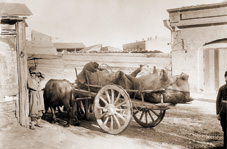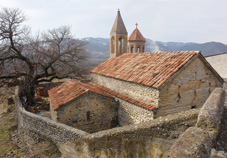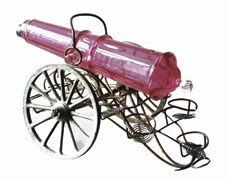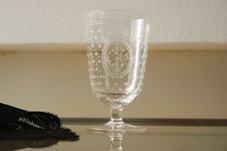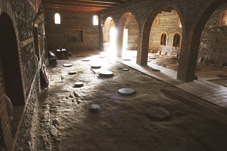
Passages from the book - Country of Liquid Sun
Friday, April 3
At the beginning of the nineteenth century, serving in the Russian Army and having a military career was considered prestigious for the Georgian aristocracy. They studied military art in Russia and then served in the Russian forces but were always aware that sooner or later they would use their acquired knowledge and military skills to protect their homeland.
After his graduation from the military school in 1830, Ivane Mukhranbatoni actively started his military career in the rank of warrant officer and was notable in the battle with the Gallagians. In 1833, as a warrior of the Dragoon Regiment of the Life Guards, he participated in the battle against the highlanders where his bravery and persistence did not go unnoticed. In 1844, he was distinguished in the battle against Elisus Suitan. Mukhranbatoni went to St-Petersburg in 1845 where he received the rank of the Jagermeister and became a Battalion Commander in 1848. By that time, Colonel Ivane Mukhranbatoni had already been awarded the medals s of Saint Stanislavsky and Saint Anna as well as a sword "for bravery" which was personally given to him by the Emperor. Contemporaries characterised him as a very friendly and, at the same time, well-disciplined commander whom "the subordinated loved so much that they would die for him."
The name of Eristavi has been mentioned in the village of Odzishi since 1465 with the Chronicles having preserved the names of the great Shalva and Rostom Eristavi. The museum of the well-known Georgian drama writers and theatre figures, Giorgi and David Eristavi, is also found in Odzishi. The palace, which is presently open for the visitors, was built at the end of the eighteenth and beginning of the nineteenth century. Unfortunately however, the palace has not survived in its initial form when it included big and bright windows set in neatly built big walls and surrounded by balconies with high arches from three sides. According to the information of Giorgi Eristavi's coachman, Gabrielashvili, the well which was dug in the big cellar, was connected by pipes to a pool in the attic of the third floor where pumped water was accumulated and distributed to the rooms by additional pipes.
The renowned drama writer, poet and theatrical figure, Giorgi Eristavi, was also a descendent of the Ksani Eristavis. He was born in 1813 in the village Odzishi. Between 1824-1825, he studied at the Tbilisi School of Nobles and then, for a short period, at a private boarding school in Moscow. Beginning in 1830, the young Eristavi actively participated in the plot against the Russian Empire. At one of the meetings he had bravely declared: "I will bring twenty lions from Odzishi against Russians" With his participation in the plot becoming the reason for his arrest in December 1832 which was followed by his exile to the city of Vilno in 1834. Being in service in the infantry division, Eristavi made friends with noble Polish families, learned the Polish language and literature and worked on a prosaic translation of The Knight in the Panther's Skin together with Professor Lapczynski. He lived eight years in exile before he returned to his homeland in 1842.
Giorgi Eristavi is the author of numerous comedies, poems and verses and was one of the first persons who founded Georgian realism and Georgian comedy writing. He established Georgian professional theatre, directing in the years 1850-1854, and established the first Georgian literary magazine, Tsiskari, and was himself its first editor. Giorgi Eristavi died in Gori in 1864 and was buried in the churchyard in Ikorti (the village Zemo Ikorti is presently located within the territory of Tskhinvali). Giorgi Eristavi's son, David, was also a well-known drama writer and public figure. He died in 1890 and was buried in Tbilisi on Mtatsminda amongst other prominent Georgians. David Eristavi was born in 1847 in the village of Khidistavi. From 1867-1871, he studied at the Odessa University and later graduated from the St-Petersburg Medical Academy.



